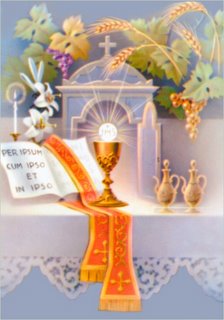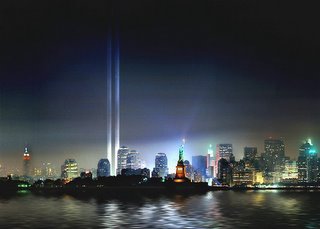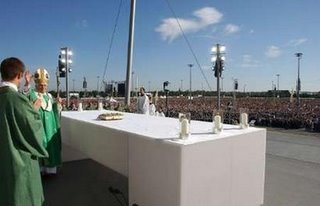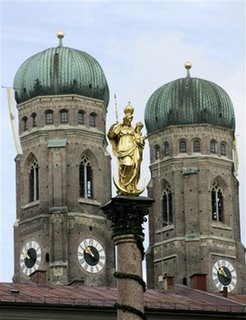
Our Lord is hidden there, waiting for us to come and visit Him, and make our request to Him. See how good He is! He accommodates Himself to our weakness. In Heaven, where we shall be glorious and triumphant, we shall see him in all His glory. If He had presented Himself before us in that glory now, we should not have dared to approach Him; but He hides Himself, like a person in a prison, who might say to us, "You do not see me, but that is no matter; ask of me all you wish and I will grant it. " He is there in the Sacrament of His love, sighing and interceding incessantly with His Father for sinners. To what outrages does He not expose Himself, that He may remain in the midst of us! He is there to console us; and therefore we ought often to visit Him. How pleasing to Him is the short quarter of an hour that we steal from our occupations, from something of no use, to come and pray to Him, to visit Him, to console Him for all the outrages He receives! When He sees pure souls coming eagerly to Him, He smiles upon them. They come with that simplicity which pleases Him so much, to ask His pardon for all sinners, for the outrages of so many ungrateful men. What happiness do we not feel in the presence of God, when we find ourselves alone at His feet before the holy tabernacles! "Come, my soul, redouble thy fervour; thou art alone adoring thy God. His eyes rest upon thee alone. " This good Saviour is so full of love for us that He seeks us out everywhere.
Ah! if we had the eyes of angels with which to see Our Lord Jesus Christ, who is here present on this altar, and who is looking at us, how we should love Him! We should never more wish to part from Him. We should wish to remain always at His feet; it would be a foretaste of Heaven: all else would become insipid to us. But see, it is faith we want. We are poor blind people; we have a mist before our eyes. Faith alone can dispel this mist. Presently, my children, when I shall hold Our Lord in my hands, when the good God blesses you, ask Him then to open the eyes of your heart; say to Him like the blind man of Jericho, "O Lord, make me to see!" If you say to Him sincerely, "Make me to see!" you will certainly obtain what you desire, because He wishes nothing but your happiness. He has His hands full of graces, seeking to whom to distribute them; Alas! and no one will have them. . . . Oh, indifference! Oh, ingratitude! My children, we are most unhappy that we do not understand these things! We shall understand them well one day; but it will then be too late!
Our Lord is there as a Victim; and a prayer that is very pleasing to God is to ask the Blessed Virgin to offer to the Eternal Father her Divine Son, all bleeding, all torn, for the conversion of sinners; it is the best prayer we can make, since, indeed, all prayers are made in the name and through the merits of Jesus Christ. We must also thank God for all those indulgences that purify us from our sins. . . but we pay no attention to them. We tread upon indulgences, one might say, as we tread upon the sheaves of corn after the harvest. See, there are seven years and seven quarantines for hearing the catechism, three hundred days for reciting the Litany of the Blessed Virgin, the Salve Regina, the Angelus. In short, the good God multiplies His graces upon us; and how sorry we shall be at the end of our lives that we did not profit by them!
When we are before the Blessed Sacrament, instead of looking about, let us shut our eyes and our mouth; let us open our heart: our good God will open His; we shall go to Him, He will come to us, the one to ask, the other to receive; it will be like a breath from one to the other. What sweetness do we not find in forgetting ourselves in order to seek God! The saints lost sight of themselves that they might see nothing but God, and labor for Him alone; they forgot all created objects in order to find Him alone. This is the way to reach Heaven.
Read more on St. John Vianney




















